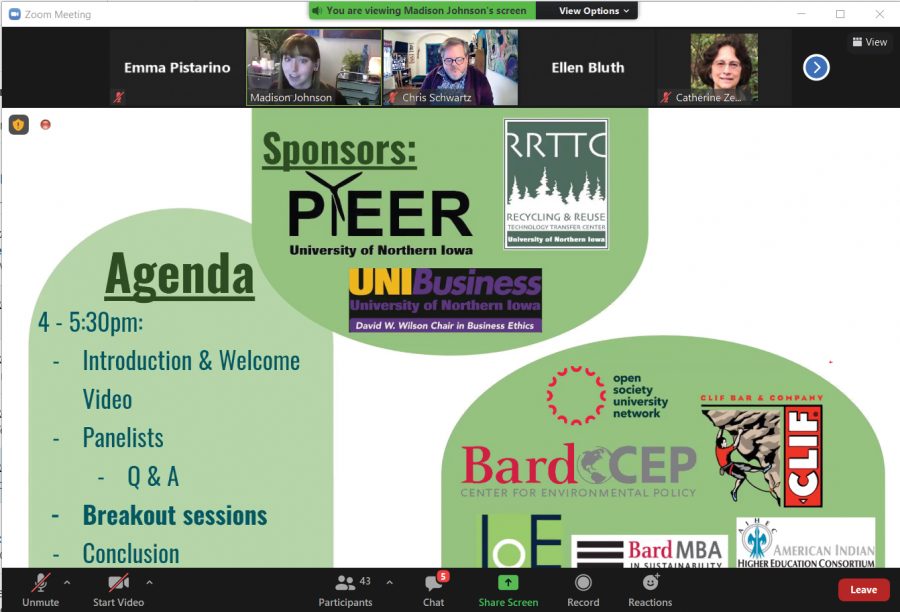UNI hosts ‘Solve Climate by 2030’ webinar
Three local speakers shared steps that can be taken to solve climate issues with students and faculty on Wednesday, April 14.
Apr 19, 2021
For the second year in a row, UNI was chosen to be Iowa’s host institution for the Solve Climate by 2030 project. This event is organized by the Graduate Programs of Sustainability at Bard College in New York and involves 100 webinars, one for every US state and for 50 other countries.
“It is literally an issue that, as a country, we can no longer afford to put-off or ignore,” said Catherine Zeman, one of the moderators of the panel and an environmental health professor at UNI. “I think (UNI’s involvement) illustrates the level of societal and campus concern for this topic. Many people feel that it is time to stop talking about the dangers of climate change and start talking about moving toward the solution.”
The goal of this series of webinars is to instruct the public, including high school and college students, on how to address issues relating to climate and the environment in their own communities. It is part of a larger effort led by the United Nations to make rapid reductions in carbon pollution by the year 2030.
Researchers identified a 10-year window for this to happen before the global climate is severely destabilized, which would lead to an increased in severe weather and natural disasters all over the world.
Three expert panelists, all from the Cedar Valley area, were able to share their knowledge with the audience and inspire them to make their communities a greener place to be.
Matt Hein, energy services manager for Cedar Falls Utilities, was the first panelist to be introduced. During his talk, Hein described local green energy options and energy efficiency as some of the foundational values of Cedar Falls Utilities.
When speaking of what we can all do to be environmental stewards in our communities, Hein was able to describe simple measures we all can take in our own homes.
“Step number one is to just turn it off. Whether it is a lightbulb or an AC, the best thing you can do for the environment is turn those off. Another option is to turn them down, meaning lowering the temperature on your thermostat or setting up a smart thermostat so it can do it itself. Beyond controls, we can start looking at the equipment and make it more efficient,” he said.
As an energy engineer, Hein was also able to suggest using different energy sources, such as solar photovoltaic, solar panels and wind energy, among others, which are already used in the Cedar Valley.
According to Hein, Cedar Falls Utilities has a program named “Simple Solar,” which aims to make it easy for customers to convert to solar energy by purchasing a unit out of Cedar Falls Utilities’ installation in downtown Cedar Falls.
The next presenter was Chris Schwartz, a Black Hawk County supervisor. He discussed areas on which the county has been working during the past years in order to improve the environmental impact of the Cedar Valley. These include solar panels, vegetable production, water and methane gas.
While telling about the steps forward the board of supervisors has taken since his first term, Schwartz expressed his support for the Green New Deal and the economic stimulus that he believes can come through an investment in green energy. He also expressed his ideas regarding the importance of communal engagement in local and federal politics.
“What I want people to take away is that you have to be persistent with this stuff,” he said. “You have to be engaged in all levels of governance, be as informed as you can be. So much can happen at the local level if the citizenry is educated, active and engaged.”
The final panelist, Ellen Bluth, Vice Chancellor for Workforce and Economic Development at the Eastern Iowa Community College District and principal investigator for the Advanced Technology Environmental Education Center, focused on green job training and workforce development.
At the Advanced Technology Environmental Education Center, the goal is to push high school graduates to get involved with the environmental area so they can learn the skills and knowledge that are needed in the field and that employers are looking for.
“A lot of time, we hear that if we cut down on fossil fuels we will lose so many jobs. If you look at the statistics, there are many more jobs in clean energy, particularly in wind and solar energy right now. The fastest growing jobs in 12 states were in renewable energy,” said Bluth.
After the three panelists had a chance to speak and answer questions, the audience was split into breakout sessions. Community members, led by a group leader, were able to express their ideas regarding what the panelists had discussed and how to make those changes a reality in their everyday lives.
“Be a part of the solution. Be informed. There are always different solutions for our problems and as long as you don’t talk about the big scary stuff, it can motivate people to be a part of the solution,” said Madison Johnson, the student moderator of the webinar.








